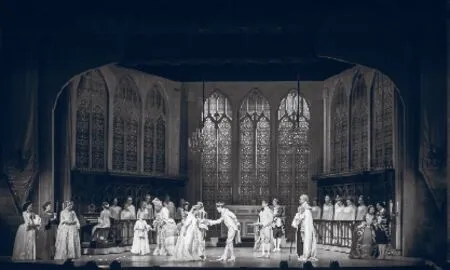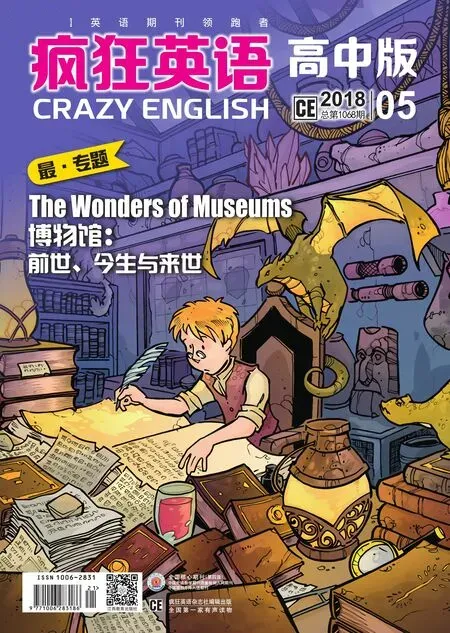Alma Deutscher—A Teenage Composer Linking Reality and Fairy Tale
2018-09-12BySethStone翻译BillyBudd
⊙By Seth Stone ⊙ 翻译:BillyBudd
11岁的时候,你在干嘛呢?或许正在为功课考试头疼不已?或许正出于爱好或应父母的要求上着钢琴或小提琴班?反正听歌剧肯定与你最喜欢的消遣方式无关,更别说写歌剧了。而阿尔玛·多伊彻在11岁时已经是位小有名气的作曲家、钢琴家兼小提琴演奏家了,因此,人们将小小年纪却才华横溢的多伊彻与同样天赋异禀的莫扎特相提并论。
多伊彻的音乐天赋与生俱来,她两岁始练钢琴,三岁习得小提琴,四岁尝试作曲,11岁时已经写出了长篇歌剧《灰姑娘》。多伊彻的音乐灵感或许来得容易,但将零零碎碎的曲调和谐地融进一首首长曲,同时还得为之构思出一个跌宕起伏的故事并不简单。世界首屈一指的指挥家西蒙·拉特尔爵士(Sir Simon Rattle)盛赞多伊彻如“自然之力”一般令人震撼,让人为之倾倒。下面我们来看看这位音乐神童的故事吧!
A very young classical composer in England is now living her very own fairy tale. Alma Deutscher began playing the piano when she was two and the violin a year later, and now she has written and composed her first opera at just 11 years of age. Her achievements are now drawing2)comparison [kəm΄pærɪs(ə)n] n. 对比,比较,后常跟介词with。comparisons with another child3)prodigy [΄prɒdɪdʒɪ] n. 奇才,神童prodigy of some4)repute [rɪ΄pjuːt] n. 名誉,声望repute, Amadeus Mozart’s.
Alma’s opera version of Cinderella premieres in Vienna, where Mozart, in fact,spent much of his adult life.
In a5)rehearsal [rɪ΄hзːs(ə)l] n. 排演,排练rehearsal packed with talent, one performer6)stick out 突出,醒目sticks out, and not just because she’s 11 years old or because she effortlessly switches between playing the violin and the piano.
Alma Deutscher composed this music,an entire opera. Coming up with the original7)score [skɔː(r)] n. (电影、戏剧等演出的)配乐;乐谱score and plot lines for her version of Cinderella took a lot of work, she admits, but she8)juggle [΄dʒʌɡ(ə)l] v. 应付,兼顾juggled it, as any child prodigy might.
Alma: Well, I got…I actually started this when I was eight, and I now was collecting lots of material for it, and I wrote9)aria [΄ɑːrɪə] n. 咏叹调arias, but it was always at the back of my mind, and10)in between 在……中间,在……期间in between I was writing my violin11)concerto [kən΄tʃeətəʊ] n. 协奏曲concerto .
Did we mention she’s 11?
Guy Deutscher (Alma’s Father) : She started singing essentially before she started speaking.
Her dad, Guy Deutscher, told us Alma always had creativity bubbling inside her, like a volcano.
Guy: I think the greatest moment is [sic]when we realized that she was playing her own12)melody [΄melədɪ] n. 旋律melodies.
Alma: In the beginning, my parents thought that I might just be trying to remember something I’d heard. But I said, “No, no, no,it’s my own. It’s my own melody.”

She says the melodies come to her when she’s most relaxed. Often that’s while playing with her younger sister, Helen, near their home outside London. At a break from rehearsal in Vienna, she showed us her secret.
Interviewer: …a magic13)skipping rope 跳绳用的绳子skipping rope.Alma: Yes.
Interviewer: Why is it magic?
Alma: Well, because, you see, when I wave it around like this and I tell stories in my mind,then a melody sometimes just14)spring [sprɪŋ] v. 涌出,涌现springs into my head.
That’s how she came up with parts of her opera.
Interviewer: Tell me about your Cinderella.She’s different.
Alma: Yes, yes, it’s completely [sic] different story because, you see, the whole thing takes place in an opera house…

Which is why Alma’s Cinderella is a composer. She wanted her15)title character 领衔主演,主人公title character to have brains and not just be pretty.
Alma: In my Cinderella...I thought it was a little bit silly that Cinderella was found by a shoe. And why a shoe? But, in my story,then, the prince finds her with a melody, so,when...before Cinderella flees at midnight and she sings the beginning of a ballad.He remembers how it starts but not how it continues, and he’s in despair, he’ll never find her until, finally, he has the16)brainwave [΄breɪnweɪv] n. 脑电波,灵感brainwave.He will set everyone in the kingdom and sing the beginning of the melody and only the girl who can finish it in the right way will be the one he’s looking for.

When she wasn’t rehearsing or talking with us, we found she’d grab a book. She says she reads about a hundred of them a year.
Alma explains she has an imaginary music school in her brain. When she skips with that rope, she hears the work of those17)make-believe [΄meɪkbɪ΄liːv] adj. 虚构的,虚幻的make-believe composers and simply takes what she likes. She bridges two worlds, and,lucky for the rest of us, shares what she hears,turning make-believe real.
作文素材常积累:阿尔玛·多伊彻——Don’t be satisfied with stories, how things have gone with others.
Unfold your own myth. 不要满足于别人口中的故事,说出你自己的故事!这句出自13世纪波斯诗人鲁米之口的诗句正是多伊彻的写照。她的《灰姑娘》就来自于她对既有“现实”的不赞同:为什么只说灰姑娘貌美?为什么非得让她跟王子通过一只水晶鞋相认?正因为不满足于听故事,还敢于讲故事,年纪轻轻的多伊彻才创作出了自己的灰姑娘。有时候,天才与普通人之间或许只有“创意”这一墙之隔。缤纷世界尽在眼中,只要敢想,你也可以创作出自己的故事!
词组:back of my mind
Back of one’s mind的意思是“在某人记忆深处”,即某事不在某人的有意识记忆内,指某人不会经常想起某事,或对某事记得不是特别清楚,却在潜意识里有这么一个印象。该词组既可搭配介词at,还可搭配in。如:
● Somewhere in the back of my mind, I knew I’d met him before.(虽然记不太清楚,但我知道我之前见过他。)
● Every night I walk along this street alone, the fear of being attacked is always at the back of my
mind.(每晚我一个人走在这条街上时,我内心深处总害怕会被人袭击。)
参考译文
一位来自英国的小古典作曲家正谱写着自己的童话故事。阿尔玛·多伊彻两岁开始弹钢琴,三岁会拉小提琴,如今,11岁的她已完成了自己的第一部歌剧作品。人们把多伊彻的成就与另一位名闻遐迩的音乐神童——莫扎特——相提并论。
阿尔玛的歌剧版《灰姑娘》在维也纳举行首演,这正是成年后的莫扎特生活多年的城市。
在人才济济的排练现场,有一位演奏者尤其突出,但这并不仅仅是因为她才11岁,或是她能毫不费力地在小提琴和钢琴演奏间自由切换。
阿尔玛·多伊彻是这部音乐作品,也就是整部歌剧的创作者。她坦承:给自己的歌剧《灰姑娘》作曲并设计故事情节的工作量确实巨大,但就像其他神童一样,她还算忙得过来。
阿尔玛:嗯,我……我实际上从八岁就开始构思《灰姑娘》了,当时就为此收集了很多资料,我还写了几首咏叹调,我总是想着它,在这期间,我也在创作小提琴协奏曲。
我们有提过她才11岁吗?
盖伊·多伊彻(阿尔玛的父亲):她在开口说话前就已经会唱歌了。
她的父亲盖伊·多伊彻告诉我们,阿尔玛的脑子里总是创意不断,就像一座小火山。
盖伊:我想,最棒是我们意识到她在演奏自己的原创旋律的那一刻。
阿尔玛:刚开始的时候,我爸妈以为我只不过在尝试回忆自己听过的曲子,但我说:“不不不,这是我自己想出来的,是我自己的旋律。”
她说,这些旋律会在她最放松的时候浮现在脑子里,通常是当她跟妹妹海伦在离家不远的地方玩耍的时候——她们家就在伦敦市郊。在维也纳排练的间歇,她向我们展示了她的秘诀。


采访者:……一条有魔力的跳绳。
阿尔玛:没错。
采访者:为什么说它有魔力呢?
阿尔玛:呃,因为,你看,当我像这样摆动它时,我就会在心里编造一段故事,然后,有时候,脑海里就会跳出一段旋律。
歌剧的部分内容就是这么来的。
采访者:跟我说说你的《灰姑娘》吧,她是与众不同的。
阿尔玛:没错,没错,这是一个完全不同的故事,因为你看,整个故事都发生在一个歌剧院里头……
因此,阿尔玛的灰姑娘是个作曲家,她希望她的主人公拥有智慧,而不是空有美貌。
阿尔玛:在我的《灰姑娘》里……我觉得王子通过一只鞋找到灰姑娘这个情节有点蠢。为什么是鞋子呢?不过在我的故事里,王子是凭借一段旋律找到她的,就是,当……灰姑娘在午夜离开之前,她唱了一首歌谣的开始部分。王子记住了歌谣的开头,但忘记了接下来的旋律,他以为自己再也找不到她了,因此陷入了绝望。最后,他灵机一动,召集了王国内的所有人,向他们唱了歌谣的开始部分,只有能正确续上歌谣的女孩才是他的真命天女。
在排练或接受采访以外的时间里,我们发现她手中总会拿着一本书。她说,自己一年大概会看100本书。
阿尔玛解释说,她脑海里有一所假想的音乐学校。在跳绳时,她会听到那些幻想中的作曲家的作品,然后随意拿走她喜欢的旋律。她能够连通两个世界,将虚幻变成现实并与世人分享,我们这些普通人也有幸分享她所听到的音乐。
